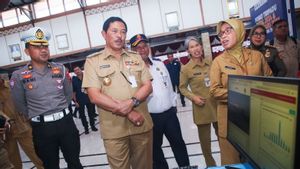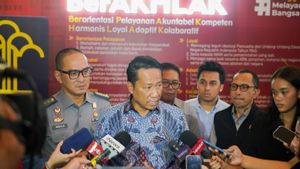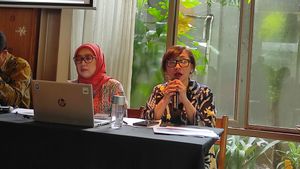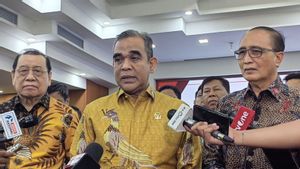JAKARTA - Professor of Forest Protection IPB, Prof. Bambang Hero Saharjo, responded to a letter from the Ministry of Environment and Forestry (KLHK) prohibiting foreign researchers Eric Meijaard et al from entering conservation areas in Indonesia. He said, each study results were very specific and could not be generalized.
The researchers must attend, because the data and conditions must be based on local conditions that they must know. Including the use of satellite images, so it's not just predicted through modeling without verifying and then claiming that what he did was correct.
Otherwise, the results of the study are only assumptions that they are wrapped in scientific research that is not guaranteed and tends to be biased, so they cannot be used as a reference.
Scientific research conducted by foreign researchers about Indonesia's biodiversity, for example, sometimes not a few saves hidden missions that should be watched out for because they do not represent actual conditions. However, the government's repressive actions against foreign researchers also cannot be justified without any basic reasons.
''Of course there is a basic reason Minister of Environment and Forestry Siti Nurbaya took this decisive action, there is no way that there is no chronology and this should be opened up to the public. If it turns out that the reason is to defend the sovereignty of the Unitary State of the Republic of Indonesia, I think the domestic public may be more angry with the foreign researcher than the Minister's anger," said Bambang, Saturday, September 24.
The academic recipient of the prestigious award John Bahel 2019 said the Mayjaard et al case was almost the same as the case of foreign researchers who had been excited some time ago regarding the area of forest and land fires in Indonesia.
They both use secondary data instead of field primary data, and modeling methodology. Although scientifically modeling is justified, ignoring field data and facts is also a fatal error in a scientific work.
One of the important points that are sometimes forgotten whether intentionally or negligently, is the validation of the calculated data they get with the actual conditions on the ground.
They can't do that because they don't have access, they need time and a lot of money, while they don't have a permit, finally the important part is that they leave.
Finally, the results of these studies are often published without validation. Bambang once explained this to one of the foreign media who questioned the Indonesian government through the Ministry of Environment and Forestry did not accept the results of his research.
''The foreign researcher apparently did not directly research in Indonesia and ignored the real data conditions in the field, clearly wrong and severe. Research like this can be dropped at any time and does not need to be used as a reference, it can even be protested to his journal because it does not represent the intent and purpose of the publication of the journal, especially for international journals. I have seen articles like this published several times, there were also when I was asked to review the draft of the writing, so I asked to revise it because the information was not true, otherwise it would be dangerous for Indonesia,' said Bambang.
The fact that foreign researchers wrote about the condition of the orangutans, knowing that in Indonesia there are also many observers who care about these animals.
There are even Non-Government Institutions that receive special foreign assistance to oversee and ensure that orangutans are really paid attention to. What they reveal, of course, has gone through the activities of friends who care about orangutans and such as eliminating their role because they have eliminated their roles that are present and intersect in the midst of orangutan habitat.
Indonesia is still the largest biodiversity owner in the world, so it is not surprising that this country is the target of foreign researchers who want to get a place to conduct direct studies and research in Indonesia.
''Maybe they want to seek attention from the government, hopefully with the pros and cons it can be embraced and get a red carpet to directly research in Indonesia. Of course this is not good either, because all researchers must understand and respect the sovereignty of each country,' said Bambang.
Bambang himself believes that there is a strong reason behind Minister of Environment and Forestry Siti Nurbaya's attitude in issuing a letter to Meijaard et al. According to Bambang, anti-criticism, anti-science and authoritarianism were not right, without the public knowing the things behind the issuance of the letter.
''I myself often give input and criticism to the government, directly to Minister Siti. Often through WA and he will definitely reply, pay attention, even support if there is our research that is useful for fixing the protection of Indonesian forests, for example regarding forest and land fires. Many environmental policies are now made based on research by domestic researchers and are not foreign researchers. So there must be a crucial reason behind Minister Siti's firm stance and this is the KLHK's homework to explain her chronology to the public,' explained Bambang.
Bambang himself became a few of the Indonesian academics who loudly voiced resistance to land fires, especially from corporations. Thanks to Bambang's testimony in court, many large concessions found guilty of damaging the environment and having to compensate public health.
Meanwhile, regarding an opinion written by Meijaard in one of the media, the Ministry of Environment and Forestry has actually given a response to the right to answer by revealing that while conducting research related to the Orang Utan, Meijaard was not in Indonesia, and all researchers in the article were also foreigners and did not involve domestic researchers according to the National System of Science and Technology (Sisnas) Law number 11 of 2019.
Meijaard is known to only use the methodology of modeling the survival of the population using assumptions, and using interpolation of past information data history. These foreign researchers also ignored the pattern of assumptions with the government's policy of stopping primary forest permits and various other wildlife protection policies.
Meijaard assumes that there will be a decline in the population of Utan people in Indonesia. What is more sadistic, leads to extinction. Whereas in 2022 there are still two orangutans born in Indonesia.
With various policy corrections, the population of Utan people in Indonesia itself has experienced a significant increase from 1,441 individuals in 2014 to 2,431 individuals in 2022. Primary data like this has been ignored by Meijaard et al.
The English, Chinese, Japanese, Arabic, and French versions are automatically generated by the AI. So there may still be inaccuracies in translating, please always see Indonesian as our main language. (system supported by DigitalSiber.id)













